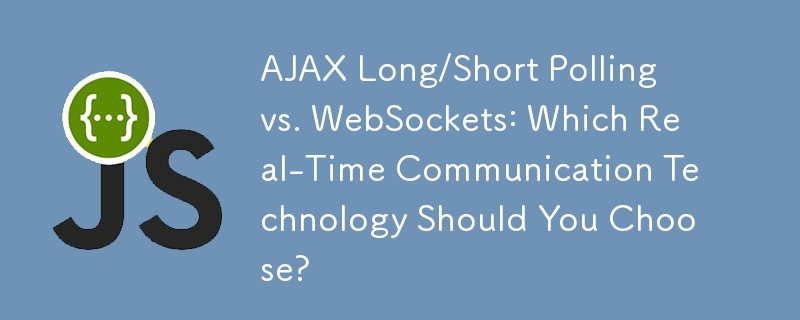
AJAX Long/Short Polling vs. HTML5 WebSockets: Which to Choose?
For real-time applications, it's crucial to receive information promptly without resorting to page refreshes. AJAX has been the traditional approach, but its frequent server hits are less desirable. Hence, long/short polling was introduced. However, the advent of HTML5 WebSockets has sparked a debate: which is superior for different scenarios?
WebSockets: The Future Standard
HTML5 WebSockets has emerged as the preferred solution, offering significant advantages over long/short polling:
-
Persistent Connection: Unlike AJAX, WebSockets establishes a persistent connection between client and server, enabling bi-directional data exchange.
-
Real-Time Communication: WebSockets provides near-realtime communication, ideal for applications like instant messaging and data streaming.
-
Reduced Server Load: Persistent connections reduce the frequency of server requests, alleviating server load.
-
Improved Latency: WebSockets optimizes data transfer, minimizing latency and enhancing responsiveness.
AJAX Long/Short Polling: Obsolescence or Still Relevant?
Long/short polling has fallen out of popularity due to the advent of WebSockets. However, it may still have specific use cases:
-
Limited Browser Support: WebSockets require support from the client browser, which may not be available in all environments.
-
Security Concerns: AJAX uses HTTP requests and responses, which can raise security issues with vulnerable clients.
Comparison of Communication Techniques
For a comprehensive understanding, here's a comparison of AJAX, long/short polling, WebSockets, WebRTC, and Server-Sent Events:
-
AJAX: One-time request-response communication using HTTP.
-
Long Polling: Extended HTTP request with a persistent connection, periodically checked for responses.
-
WebSockets: Persistent bi-directional communication over TCP with message framing and encryption.
-
WebRTC: Peer-to-peer communication for streaming and real-time applications.
-
Server-Sent Events: Unidirectional data transfer from server to client over a persistent connection.
Advantages of WebSockets
Server-side, WebSockets offer compelling advantages:
-
Enhanced Performance: Shared memory between socket connections enables efficient data handling.
-
Architecture Optimization: Eliminates the need for databases as intermediaries.
Security Considerations
WebSockets offer robust security measures:
-
Encryption: Supports both HTTP and HTTPS protocols for secure data transfer.
-
Frame Masking: Encrypts data sent from client to server, reducing the risk of eavesdropping.
In conclusion, HTML5 WebSockets have largely superseded AJAX long/short polling as the preferred technology for real-time communication. Their superior performance, persistent connections, and enhanced security make them the optimal choice for applications that demand timely and efficient data exchange.
The above is the detailed content of AJAX Long/Short Polling vs. WebSockets: Which Real-Time Communication Technology Should You Choose?. For more information, please follow other related articles on the PHP Chinese website!






